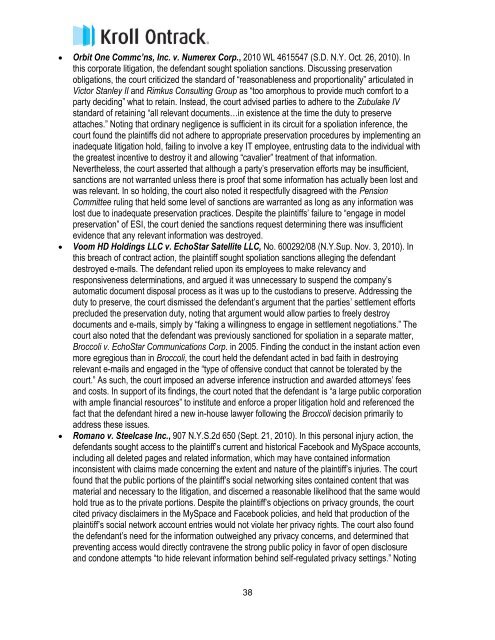Electronic Discovery and Computer Forensics Case List - Kroll Ontrack
Electronic Discovery and Computer Forensics Case List - Kroll Ontrack
Electronic Discovery and Computer Forensics Case List - Kroll Ontrack
Create successful ePaper yourself
Turn your PDF publications into a flip-book with our unique Google optimized e-Paper software.
� Orbit One Commc’ns, Inc. v. Numerex Corp., 2010 WL 4615547 (S.D. N.Y. Oct. 26, 2010). In<br />
this corporate litigation, the defendant sought spoliation sanctions. Discussing preservation<br />
obligations, the court criticized the st<strong>and</strong>ard of “reasonableness <strong>and</strong> proportionality” articulated in<br />
Victor Stanley II <strong>and</strong> Rimkus Consulting Group as “too amorphous to provide much comfort to a<br />
party deciding” what to retain. Instead, the court advised parties to adhere to the Zubulake IV<br />
st<strong>and</strong>ard of retaining “all relevant documents…in existence at the time the duty to preserve<br />
attaches.” Noting that ordinary negligence is sufficient in its circuit for a spoliation inference, the<br />
court found the plaintiffs did not adhere to appropriate preservation procedures by implementing an<br />
inadequate litigation hold, failing to involve a key IT employee, entrusting data to the individual with<br />
the greatest incentive to destroy it <strong>and</strong> allowing “cavalier” treatment of that information.<br />
Nevertheless, the court asserted that although a party’s preservation efforts may be insufficient,<br />
sanctions are not warranted unless there is proof that some information has actually been lost <strong>and</strong><br />
was relevant. In so holding, the court also noted it respectfully disagreed with the Pension<br />
Committee ruling that held some level of sanctions are warranted as long as any information was<br />
lost due to inadequate preservation practices. Despite the plaintiffs’ failure to “engage in model<br />
preservation” of ESI, the court denied the sanctions request determining there was insufficient<br />
evidence that any relevant information was destroyed.<br />
� Voom HD Holdings LLC v. EchoStar Satellite LLC, No. 600292/08 (N.Y.Sup. Nov. 3, 2010). In<br />
this breach of contract action, the plaintiff sought spoliation sanctions alleging the defendant<br />
destroyed e-mails. The defendant relied upon its employees to make relevancy <strong>and</strong><br />
responsiveness determinations, <strong>and</strong> argued it was unnecessary to suspend the company’s<br />
automatic document disposal process as it was up to the custodians to preserve. Addressing the<br />
duty to preserve, the court dismissed the defendant’s argument that the parties’ settlement efforts<br />
precluded the preservation duty, noting that argument would allow parties to freely destroy<br />
documents <strong>and</strong> e-mails, simply by “faking a willingness to engage in settlement negotiations.” The<br />
court also noted that the defendant was previously sanctioned for spoliation in a separate matter,<br />
Broccoli v. EchoStar Communications Corp. in 2005. Finding the conduct in the instant action even<br />
more egregious than in Broccoli, the court held the defendant acted in bad faith in destroying<br />
relevant e-mails <strong>and</strong> engaged in the “type of offensive conduct that cannot be tolerated by the<br />
court.” As such, the court imposed an adverse inference instruction <strong>and</strong> awarded attorneys’ fees<br />
<strong>and</strong> costs. In support of its findings, the court noted that the defendant is “a large public corporation<br />
with ample financial resources” to institute <strong>and</strong> enforce a proper litigation hold <strong>and</strong> referenced the<br />
fact that the defendant hired a new in-house lawyer following the Broccoli decision primarily to<br />
address these issues.<br />
� Romano v. Steelcase Inc., 907 N.Y.S.2d 650 (Sept. 21, 2010). In this personal injury action, the<br />
defendants sought access to the plaintiff’s current <strong>and</strong> historical Facebook <strong>and</strong> MySpace accounts,<br />
including all deleted pages <strong>and</strong> related information, which may have contained information<br />
inconsistent with claims made concerning the extent <strong>and</strong> nature of the plaintiff’s injuries. The court<br />
found that the public portions of the plaintiff’s social networking sites contained content that was<br />
material <strong>and</strong> necessary to the litigation, <strong>and</strong> discerned a reasonable likelihood that the same would<br />
hold true as to the private portions. Despite the plaintiff’s objections on privacy grounds, the court<br />
cited privacy disclaimers in the MySpace <strong>and</strong> Facebook policies, <strong>and</strong> held that production of the<br />
plaintiff’s social network account entries would not violate her privacy rights. The court also found<br />
the defendant’s need for the information outweighed any privacy concerns, <strong>and</strong> determined that<br />
preventing access would directly contravene the strong public policy in favor of open disclosure<br />
<strong>and</strong> condone attempts “to hide relevant information behind self-regulated privacy settings.” Noting<br />
38

















